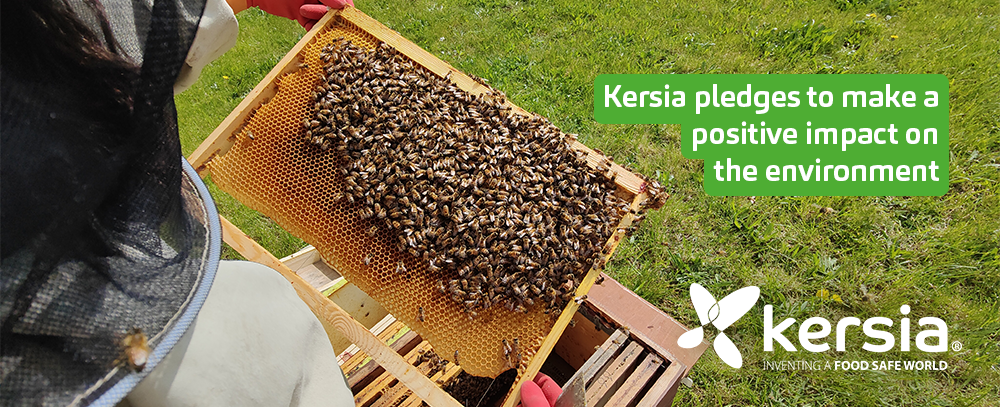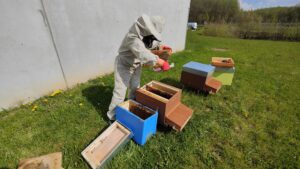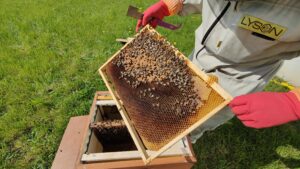Kersia pledges to make a positive impact on the environment through a partnership with BeeOdiversity
The story began in June 2022 when Kersia organized a webinar on the theme of biodiversity to raise awareness of the issue among all its employees. The speaker, Dr. Back Kim Nguyen, social entrepreneur, and founder of BeeOdiversity, spoke about his commitment to the bee and biodiversity protection.
This webinar was a real eye-opener for the group’s employees, who showed great interest in the subject. In response to the widespread interest, Kersia decided to commit itself and signed a partnership with the Belgian company BeeOdiversity.
Biomonitoring hives to create value by preserving and enhancing biodiversity and the environment.
“It was the disruptive approach that attracted us to this societal commitment: using nature as an indicator of environmental impact by analyzing pollen to measure biodiversity and assess the impact of our sites. This project is fully in line with our “Act for a positive impact” strategy: at Kersia we are committed to act and create value for the well-being of the population and the planet. Our commitment goes beyond the protection of bees, it is to act on the preservation of the planet”, says Isabelle Demoment, Kersia CSR Director.
The project consists of installing BeeOmonitoring, a biomonitoring solution, on our sites to measure local plant biodiversity and assess the impact of our industrial activities on the environment. BeeOdiversity will be in charge of this assessment through the analysis of pollen collected by bees which act as natural drones and bioindicators.
Let’s remember that bees are threatened by 3 factors: pollution, the reduction of their food sources and diseases.
Concrete implementation on a pilot site
In concrete terms, Kersia will deploy biomonitoring beehives on two pilot sites from April 2023, the industrial site of Seneffe (Belgium) where the group has a production plant and is planning to build a new building to receive the group’s centre of excellence. “This is an opportunity to measure our impacts before, during and after the construction of this new building and to improve the environment around the site through the development of green spaces (flower meadows, hedges, nourishing plants and shrubs),” explains Mireille Vandermarliere, Quality Manager & CSR Delegate. Biomonitoring beehives have also been installed on the second pilot site, an industrial site in Plaintel (France) where the group has an industrial animal feed activity.
The scope of this study concerns the biodiversity of the site, but also the surrounding area of approximately 700 ha.
Pollen analysis will be performed 4 times a year between April and October. The measures collected by this biomonitoring will then allow us to take targeted action, if necessary, by collaborating or engaging with the local community as well as analyse the efficacy of the measures taken, with scientific indicators and figures.
“We don’t know what the results of these first analyzes will be, but our primary objective is to act for the environment of tomorrow by involving all stakeholders. We are proud to contribute to the preservation and regeneration of biodiversity. We are proud to federate our teams and local and regional actors to participate together in the well-being of the population and the planet” concludes Isabelle Demoment.
The implementation of the biomonitoring solution by the Kersia group will enable to improve its impact both on site and on the local territory.
Accompanied by the teams of BeeOdiversity, and by a local beekeeper, the project has been carefully studied to ensure the safety of employees on site.
Kersia hopes to raise collective awareness of the biodiversity crisis through this project. It is by federating the group’s employees, elected officials, local residents and other industries that together we will improve the environment. It is also intended to foster a healthy work atmosphere for employees, promoting their well-being.
Read more:
The bee, an endangered species
Bees are key pollinating insects for the reproduction of many plants and food production, but their population is in danger. According to the latest data, approximately 33% of bees die each year due to habitat loss, pollution, pesticides and disease. To save these valuable pollinators, it is essential to understand the root causes of their demise. Pesticides are just one of many factors threatening their survival. Efforts to improve food quality, reduce pollution and control disease are equally important.
BeeOdiversity: the company that revolutionizes the protection of bees and biodiversity.
BeeOdiversity is a Belgian company committed to the protection of biodiversity and, in particular, bees. The company’s aim, which is active in over 20 countries, is to provide scientific data, solutions, and advice to create economic and societal value with biodiversity regeneration. Through their innovative solution, BeeOmonitoring, they can monitor biodiversity and agricultural and industrial pollution and thereby assist public and private sector partners in promoting biodiversity protection and sustainable practices. They have also been able to reduce pesticides and pollutants in the environment, supporting biodiversity. The solution also aids in the monitoring of bee colonies and the early detection of health issues. BeeOdiversity is a societal impact company whose DNA is to improve the environment for the well-being of all. Their work has been recognized with awards for its scientific, economic, and social approach. They also work to integrate biodiversity into the strategies of partner companies, with the goal of becoming biodiversity leaders in their industry.
For more information: www.beeodiversity.com



